heArt II hearT Act d/dx(3x + IX)— Fwd:Fwd:Re:“Kingdom Hearts II Final Mix”
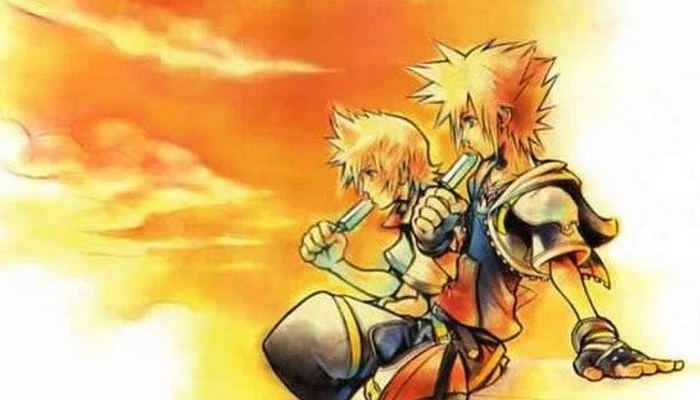
This is the third part of a series I’m writing as I play every Kingdom Hearts game for the first time. You can find links to my previous pieces on Kingdom Hearts Final Mix and Kingdom Hearts Re:Chain of Memories here. It probably goes without saying, but the following will contain spoilers for Kingdom Hearts II.
Dang it…
I think I’m a Kingdom Hearts fan.
When I played Kingdom Hearts and Chain of Memories, I did so from a somewhat removed perspective. I wasn’t really here to have fun, I was here to learn; I wanted to see if I could understand what other people saw in this series. I spent a lot of my time with both of those games frustrated and annoyed, even if I was able to enjoy bits and pieces of them. I was okay with that, because the point was just to see things for myself.
But when I chased Xemnas through the door to a world of nothing, where he tried to crush me with the raw constructive power he’d absorbed from Kingdom Hearts before it imploded, and I teamed up with Riku to destroy him as he fused with a colossal robot dragon, I wasn’t experiencing the game through any kind of detached perspective.
I was just legitimately fuckin’ psyched.
(I am preemptively telling anyone who wants to correct me about the details of the final boss fight of Kingdom Hearts II to shush.)
I’ve mentioned before that when I said I was gonna be playing through every Kingdom Hearts game, the KH-lovers I knew actually tried to discourage me. People generally seemed to agree that most of the games weren’t really worth playing, even if they considered themselves fans of the series. But, there was one exception. Nearly everybody seemed to agree that at least one game was definitely worth experiencing first-hand, and that game was Kingdom Hearts II.
And now I get why that’s the case.
Kingdom Hearts II Is… Good??
This is the first time that I think I can say without reservation that I liked a Kingdom Hearts game. Chain of Memories was interesting, and Kingdom Hearts was charming, but Kingdom Hearts II? I think it’s just good.
That doesn’t mean that it’s without its problems, but I don’t think anyone would deny that. Even the biggest Kingdom Hearts fans seem to acknowledge that it’s a flawed experience, even at its best. Again, a lot of them told me not to play any of the video games in this video game series that they love. Even in the case of Kingdom Hearts III, most of the fan response I’ve seen has been extremely positive, but I’m still catching bits and pieces about how certain sections are bad. There just isn’t a “perfect” Kingdom Hearts game.
But, Kingdom Hearts II certainly comes closer than the series has so far.
The Art Direction is Still Amazing
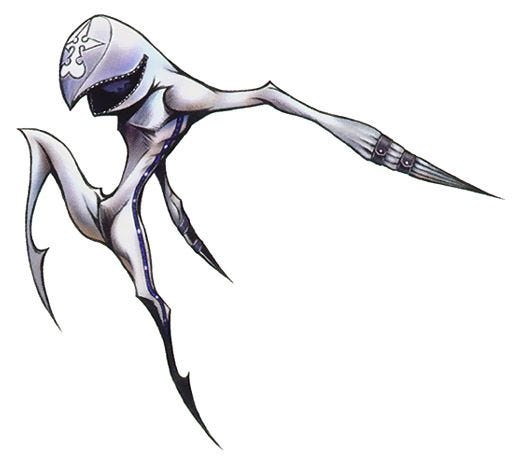
I can imagine that I’ll be talking up the art direction in just about every one of these pieces. It is probably the single strongest aspect of the series. The World That Never Was is fantastic, and it’s cool to see more parts of the other original worlds from Kingdom Hearts. There’s like, a whole town in the Destiny Islands! It’s nuts!
Just like the first game, the absolute best part of the art direction is the enemy design. The Dusks look fantastic. It would’ve been easy to make them just look like “Heartless except grey,” but they have their own unique aesthetic that makes them feel completely different. Instead of being squat, round, cute little demons like the Heartless, the Dusks are thin, lithe, and pointy. They also animate completely differently, moving as if their bodies were made of mercury, folding and stretching and twisting around. They feel unnatural and alien in exactly the way they should. Plus, they unzip their heads and there’s little Heartless in there??? I love them.
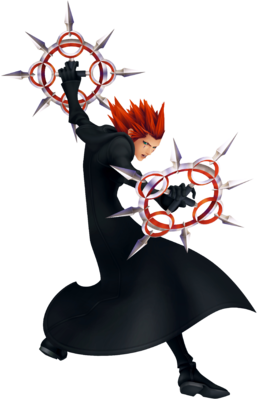
A lot of the character design is really strong in KHII as well, but this is actually one area where I thought the game was a slight step back from the original. The main problem is that every member of Organization XIII dresses in exactly the same way. Obviously this is an issue that started in Chain of Memories, but you feel it even more here.
I get the effect that they’re going for. It’s an ominous group of conspirators who sit around in big doofy chairs and plot schemes; the black cloaks make sense for that. It also lets them build a sense of mystery around which member of the Organization you’re looking at in any given scene, and the anonymous clothing suits the idea that these people are “Nobodies.” But even so, I got pretty bored of looking at cloaks by the end of the game, and I think it would’ve been neat if at least some of the time they wore unique outfits, especially if they were informed by the design of the Dusks.
The Combat Has Improved!
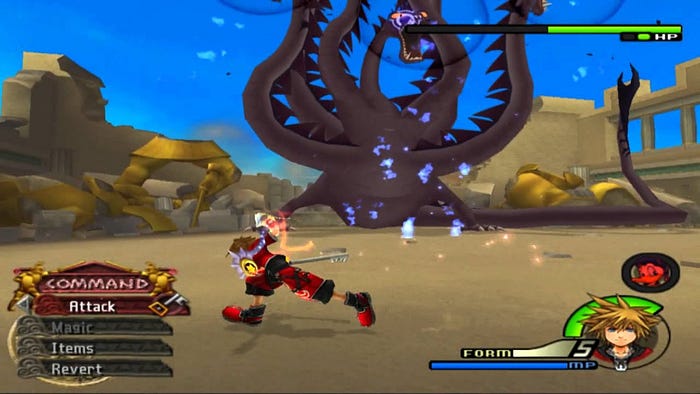
The combat in Kingdom Hearts was… technically functional? It’s mostly just very boring and simplistic, with a few spikes in difficulty that felt more annoying than anything.
I don’t think Kingdom Hearts II has like, a good combat system. It’s still pretty basic, and most of the combat still boils down to mashing the X button. But everything feels a little bit better now. They’ve also piled a big heaping helping of spectacle onto everything. “Reaction Commands” have become a major part of the game now. Triangle has become a context sensitive button that’s basically used for QTEs, so that they can intercut the action with lots of cool little stunts and maneuvers. Some of them get really clever, where your entire command list is changed dynamically to suit weird encounter- or even enemy-specific mechanics. It’s neat.
The other big addition is the Drive system. Sora now has magic pants that can eat one of his party members to give him their powers. Using the different transformations a lot levels them up, and unlocks some of their abilities for use in your base form. It’s neat, but I wasn’t quite as wowed by it as I’d hoped. For one thing, the meter that powers your forms recharges very slowly until near the end of the game, which made me skittish to pull the trigger on it all that often.
Also, Valor Form, the transformation you get by putting Goofy in your tummy, kind of breaks everything? It feels great to use, it looks awesome, and it makes the other forms feel kind of pointless by comparison. It’s honestly kind of frustrating, because any time you switch to Valor Form the game suddenly feels good to play, and then your meter runs out and it goes back to feeling just okay.
They’re still really not where I’d want them to be with the combat, but they’re absolutely making some great steps in the right direction. It’s gone from like, a D to a C+. Fingers crossed that they keep improving.
Oh Thank God They Fixed the Level Design
I… I don’t hate playing through these levels?
Holy shit, I don’t hate playing through these levels!
The level design in Kingdom Hearts II isn’t really anything special. It’s basically just a string of combat arenas. But after two games of dogshit level design I am absolutely okay with them going with something basic that works. You don’t have to run around in circles talking to NPCs in exactly the right order to advance the game anymore! You just… do the obvious thing the game is telling you to do, and it works! My God!
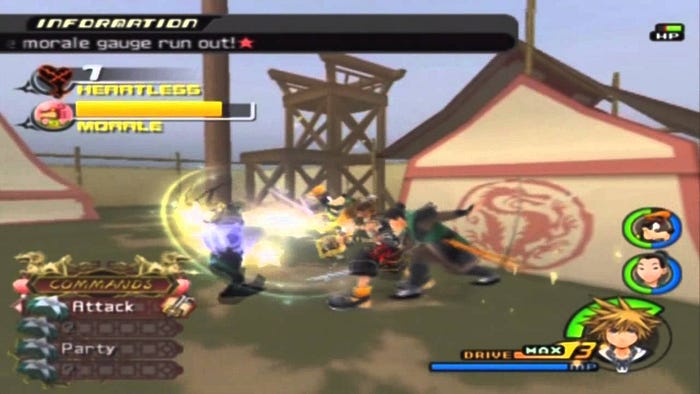
To balance out the simplistic level design, they’ve tried to broaden the types of objectives they give you. Instead of just beating all the enemies and progressing, you have to do things like manage your party’s morale, collect orbs that drop out of your enemies, and a few other things. They don’t actually do all that much to spice up the gameplay, but they’re also pretty unintrusive.
I still don’t love every world, but the design of them doesn’t feel fundamentally broken anymore. Still, there’s a few in there that are kinda… blah. Haloweentown really drags, especially on the second visit. The Pirates of the Caribbean world is also pretty terrible, with long, uninterrupted cutscenes where they reenact scenes from the first PotC movie, with no greater connection to the overall story. And then once they do let you play, all the enemies have this really annoying gimmick where they’re invincible unless they’re standing in moonlight. It stinks.
And, of course, there’s Atlantica. You know what? Atlantica deserves its own separate sidebar. Matter of fact it needs its own section entirely.
So, Atlantica.
I’ve heard a lot of shit-talk about the Little Mermaid worlds in both PS2 Kingdom Hearts games over the years. I’d heard that Atlantica in the first game was plagued with awful swimming controls, and that in Kingdom Hearts II it was an obnoxiously terrible rhythm game.
I thought Atlantica was fine in Kingdom Hearts. It wasn’t the most fun I’d ever had, but it really wasn’t markedly worse than the rest of the game’s level design, and the swimming controls weren’t really a problem at all. Since I came away from the first game thinking that everyone had kinda made a big fuss about nothing, I was sort of expecting Atlantica in Kingdom Hearts II to be comparable. I didn’t think it was gonna be, y’know, Guitar Hero or anything, but figured it would be a perfectly acceptable minigame that people got way too fussy over.
And thennnn I got to the first song.
The idea of doing a rhythm game in Kingdom Hearts makes a lot of sense. The majority of Disney’s most famous films are musicals, so if the series really wants to capture the feeling of Disney, then it should include something that centers the music. And if you’re looking for a world to transform into a rhythm game, Atlantica makes the most sense. Everyone complained about the swimming controls in the last game, and this way you can include The Little Mermaid without much swimming at all. Additionally, The Little Mermaid is responsible for reviving the Disney musical, so making its world all about the music feels like an appropriate tribute. And, its plot heavily features music, so it’s easy to explain why there’s so much singing all of a sudden. On paper, this is a great idea. A real slam run, home dunk of a concept.
And they goofed it up so hard.
Go back and watch that video. No, really, watch it. I know you didn’t the first time. You need to see it if you haven’t, and if you have, you should watch it anyway because it’s probably been a while. It is an atrocious song. “Song” is almost too generous a word for what it is! It sounds like a bunch of people mumbling over a MIDI file programmed to play whenever you hit the “fiesta” button on a cheap keyboard. To be… exceedingly fair to this thing, this is the worst song in the game, and it does improve incrementally from here. You eventually get to play songs from The Little Mermaid, but the catch is that they’ve been rerecorded with the Kingdom Hearts voice cast. And, Haley Joel Osment is a very talented actor. But singing is, perhaps, maybe not one of his strong suits.
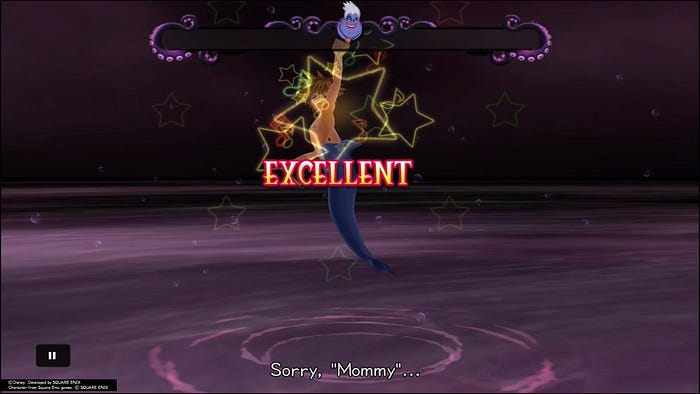
And then, somehow, the interactive element is even worse! There’s zero sense of rhythm to this rhythm game. The button prompts come up so infrequently that they feel completely disconnected from the music. You have to tap a button at completely random times, which coincidentally just so happen to fall on the downbeat of the song.
How the hell did this happen? Between Disney and Square-Enix, how many people looked at this and said, “yes that is acceptable”? This game cost millions of dollars and was worked on scores of talented designers, artists, and programmers, and the end result was still somehow this bad.
And, I kind of love it.
Okay wait no listen LISTEN. Hear me out. These rhythm game sequences are so terrible, so fundamentally incompetent in nearly every possible aspect… that I think it’s almost a little endearing. I look at “Swim This Way,” and I feel the same way I do when I watch a baby animal fall over trying to walk in a straight line. “Oh no!! The poow widdle puppy fewl down!!” Except it’s not a poow widdle puppy, it’s a major video game publisher working in concert with the biggest entertainment corporation in the world. There is no reason for this thing to exist in the state that it does, and yet, it exists anyway. It is a minor miracle.
I wanna read an entire book about the development process of just this one section of Kingdom Hearts II. I have listened to “Swim This Way” about ten times at this point. It is mesmerizing, in every way except for the one in which it’s supposed to be.
*Exhales.*
I should probably shut the fuck up about Atlantica and talk about, you know, the parts of this game that anyone else cares about even a little bit, huh?
I dunno, what do y’all wanna talk about? The Gummi Ship is better in this game. I still didn’t engage with it beyond the bare minimum required, but I appreciated that they made more fully-fleshed out levels with unique art assets. Um… I don’t really have anything to say about the crafting system; my eyes have immediately glazed over whenever I’ve opened that menu in any of these games. Don’t really know what else to talk about… Oh! Ohhhh right, we gotta talk about
THE STORY
The story in Kingdom Hearts II is a weird one. I feel like a lot happened, but from a big-picture plot perspective, I’m not sure if all that much actually did? Things also started to get a little confusing in this one. I had to have folks check my understanding once or twice to make sure I was following the plot correctly.
*Deep breath.* Okay. Let’s go.
When a person’s Heart becomes a Heartless, their empty body has a chance of being reborn as a Nobody, a person who looks and acts similarly to the original person, but supposedly has no Heart and therefore no feelings of their own. The game opens with an extended prologue where you play as Roxas, Sora’s Nobody. Roxas was a member of Organization XIII, before being kidnapped by DiZ from Chain of Memories. He’s been trapped in a computer simulation and had his memories wiped, and is slowly being killed, because for some reason, him being alive is making it so that Sora can’t wake up from the memory pod he entered in the last game.
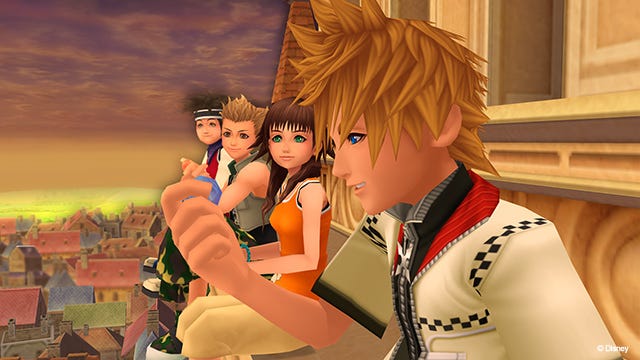
Naminé helps Roxas survive by rejoining him with Sora, who finally wakes up as a result. Sora is shocked to learn that an entire year has passed while he was asleep (side note, he went through puberty while in his memory coma, and it’s extremely funny to see him walking around in his now too-small clothes from the first two games. Great joke, KH). Sora, Goofy and Donald learn that six members of the Organization are still at large, and are roaming the worlds creating Heartless so that they can recruit their Nobodies.
The game becomes sort of open-ended at this point, without a singular driving narrative. Goofy, Sora and Donald explore the multiverse, meeting up with friends from the first game, searching for clues about Organization XIII, and trying to find Riku and Mickey. This is intercut with scenes of Organization XIII ominously plotting from very tall chairs, as well as scenes of a newly revived Maleficent working to rebuild her army of Heartless and continue her evil plans from the first game with the help of Mean Pete.
All of these plots eventually collide at Hollow Bastion. Sora meets up with Mickey, who drops a big plot bomb: the Ansem from the first game wasn’t actually Ansem. Ansem was a wise and kindly king who was friends with Mickey, who then mysteriously vanished one day. The man they fought at The End of the World was the heartless of Xehanort, one of Ansem’s apprentices, who began impersonating Ansem for reasons that aren’t yet clear. Xehanort’s Nobody, Xemnas, is the leader of Organization XIII. If you’re reading the secret reports you’re collecting, you also learn that about half of the Organization is comprised of the rest of Ansem’s apprentices, who all decided to become Nobodies and follow Xemnas, again, for reasons that aren’t yet clear.
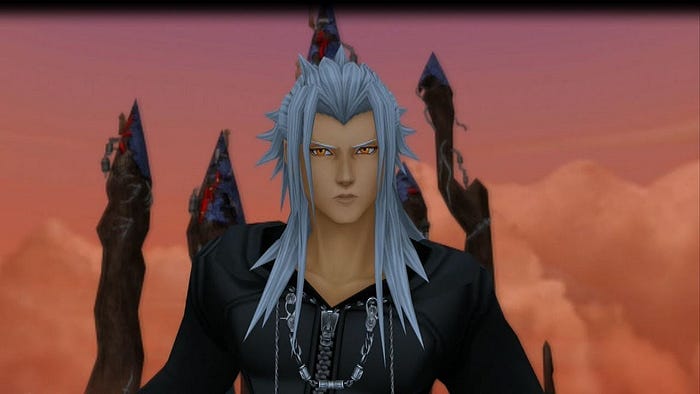
Hollow Bastion erupts into a huge war as both Maleficent’s Heartless and Xemnas’ Nobodies attack, and everyone has to rally together to fight them off. At this point, the Organization decides to reveal their plan to Sora. They’re using him, creating large numbers of Heartless that he has no choice but to defeat, and then collecting their hearts, in order to combine them into Kingdom Hearts. With the power of Kingdom Hearts, they plan to create a whole new world, just for Nobodies.
It’s very tempting to get hung up on how the way this game portrays and talks about Kingdom Hearts doesn’t really jibe with how the first game did. In Kingdom Hearts it was an all-powerful light behind a door, and here it’s just a big dumb heart-moon that has to be built? It doesn’t make a ton of direct, concrete sense, but I think if you don’t try to be too literal about it it’s pretty easy to understand. Kingdom Hearts is the heart of the entire universe, which is comprised of the hearts of everybody IN that universe. So, for any given collection of random hearts, the bigger the collection, the closer to Kingdom Hearts it is. What Xemnas is building may not necessarily be the real, true Kingdom Hearts, but it appears to be close enough to the real thing for his purposes.
Sora heads back out into the world to hunt down the remaining members of the Organization. Eventually, he and Mickey discover a path to The World That Never Was. With help from Axel, a close friend of Roxas’ who gives his life to save the “real” version of his friend, they manage to infiltrate the world. Roxas starts to “wake up” inside of Sora, who begins to remember his other self. Sora battles his way through the Organization’s castle, and finally reunites with both Riku and Kairi, who had set out from the Destiny Islands to find her friends. Riku looks like Xehanort now, because… I mean, look, it kinda doesn’t matter, he reverts to his old body like five minutes later.

DiZ reveals that he was the original Ansem. He was betrayed by Xehanort and his pupils, who all became Nobodies, and as a result, he really hates Nobodies. He’d been working to help Sora from behind the scenes, because he wanted him to kill all the Nobodies for him. He sabotages Kingdom Hearts, but dies in the process, and expresses regret for being so driven by anger and revenge.
A huge, climactic battle with Xemnas ensues. In the end, everyone but Riku and Sora escape, who have to stay behind to finish him off. It appears that they’re going to be trapped forever on the shores of The World That Never Was, but Kairi’s friendship powers are able to pull them back to the Destiny Islands, where they live happily ever after.
Pfooo. Okay. There’s a lot to talk about here.
Kingdom Hearts II is a real slippery fuckin’ game. I’ve rewritten this section three times now trying to nail down what, exactly, this story is about.
Let me walk you through why I’m finding this so tricky.
The Nobodies Deserve Our Sympathy
I talked about it when I wrote about Chain of Memories, but everything we’re told about the Nobodies and Organization XIII is a very obvious lie. The Organization isn’t organized, and the Nobodies are, well, somebodies. They’re unique people with thoughts, feelings, goals, and flaws.
None of the “authorities” in the world of Kingdom Hearts are capable of noticing that though. Sora is first told about Nobodies by Yen Sid, who, interestingly, uses a Dusk to explain what a Nobody is. Dusks are Nobodies that have lost their original form and sense of self, and largely behave just like the Heartless. It’s pretty clearly disingenuous to equate them to the human Nobodies.
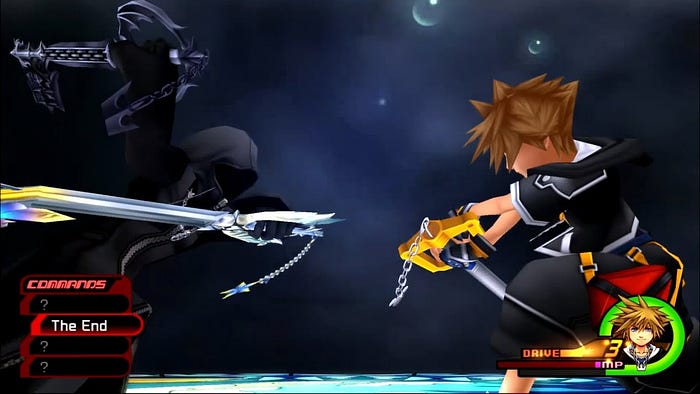
By this point, you’ve already played through Roxas’ story. You’ve seen him struggle with the strange detachment he feels about the world around him. But that frustration and melancholy doesn’t have anything to do with some kind of fundamental flaw in Roxas’ being. It’s because he’s been imprisoned in a computer simulation that’s slowly killing him. His story is intercut with scenes of DiZ cruelly mocking him for conceiving of himself as a real person. DiZ callously murders a child, and because he’s a “Nobody,” he doesn’t even care.
Everyone seems completely bought in to the idea that Nobodies can’t feel, even the Nobodies themselves. But the game goes out of its way to show you over and over again that the Nobodies absolutely have feelings. Axel in particular betrays all of his allies and even gives his own life because of his love for Roxas.
There’s a flashback near the end of the game that makes all of this explicit. Roxas and Axel are perched on the Twilight Town clocktower, eating ice cream and talking about how it sure seems like they have hearts. Everyone keeps telling them that they don’t, and yet, they’ve formed a friendship that it doesn’t seem like empty shells would be capable of.
As an aside, I love how this game handles Roxas. You only get snapshots of his life, but they elegantly tell you everything you need to know to understand his character. That flashback with Axel makes you realize that the simulated Twilight Town was inspired by his real memories, with his real friends replaced by fakes. It’s not clear what drove him to leave the Organization, but it doesn’t really need to be. Of course he’d leave, they’re the bad guys. Like Sora’s memory loss in Chain of Memories, it’s a piece of the game that uses a subtler touch than usual, and it’s extremely successful. The Roxas prologue is some of the most affecting stuff in this series so far, skateboarding mini-games and all.
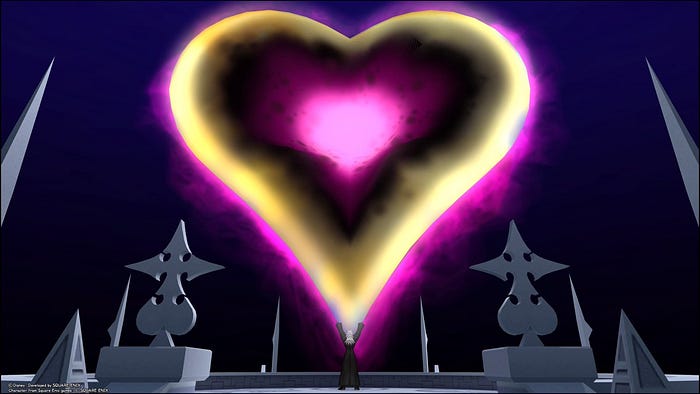
Near the end of the game, DiZ, that is to say, Ansem, is about to die. He explains that he’s come to regret how hatefully he’s behaved, and that he understands now just how cruel he was to Roxas. He tried to use Sora as a tool for revenge, and he’s finally seen the error of his ways, because of the noble actions of Sora and Riku.
So, at this point, the message of the game seems relatively clear-cut. All life experiences are valid, and it’s evil to dehumanize others just because their identities don’t seem compatible with your understanding of the world. Your understanding of the world is inherently incomplete, and it always will be, so you need to leave your heart open to new ideas.
But this is where this whole thing starts to get tricky, because this exchange happens:
Xemnas: You accept darkness, yet choose to live in the light. So why is it that you loathe us who teeter on the edge of nothing? We who were turned away by both light and dark — never given a choice?
Riku: That’s simple. It’s because you mess up our worlds.
Xemnas: That may be… However, what other choice might we have had?
Sora: Just give it a rest. You’re Nobodies! You don’t even exist! You’re not sad about anything!
Xemnas: [Laughs] Very good. You don’t miss a thing. I cannot feel sorrow. No matter what misery befalls the worlds. No matter what you think, what you feel, or how you exist.
Prior to this scene, Sora has had a Nobody give up his life for him. He’s learned about Roxas, a Nobody version of himself that lived his own rich, full life. And he just watched a broken old man sadly soliloquize about how he forfeited his soul to anger and hatred.
And now, here he is at the climax, parroting that old man’s hateful rhetoric. And… the person he directs it at confirms that he’s right to think in those terms. Hhhuh.
So, let’s set everything I just talked about aside for a moment, and attack this from a different angle. Let’s talk about Xemnas.
The Nobodies Do Not Deserve Our Sympathy
We don’t get a strong sense of Xemnas’ character in this game. He has only a little more screentime than Ansem (sorry, Xehanort) did in Kingdom Hearts, and he doesn’t get the benefit of being characterized through secret reports, because this time around those are written from the perspective of DiZ (sorry, Ansem). He’s one of the only Nobodies that seems to live up to their reputation for being emotionless, speaking in a deep, dull monotone. But even he ends up showing that he’s capable of feeling, yelling about his hatred and anger throughout the final battle. He gives the impression of someone who thinks they’ve achieved a level of intellectual enlightenment that means he no longer has to care about anyone else. He presents himself as cold, logical, and neutral, but he’s actually just hateful and obsessed with power.
Which makes him a slightly different flavor of right-wing shitbag than Xehanort was.
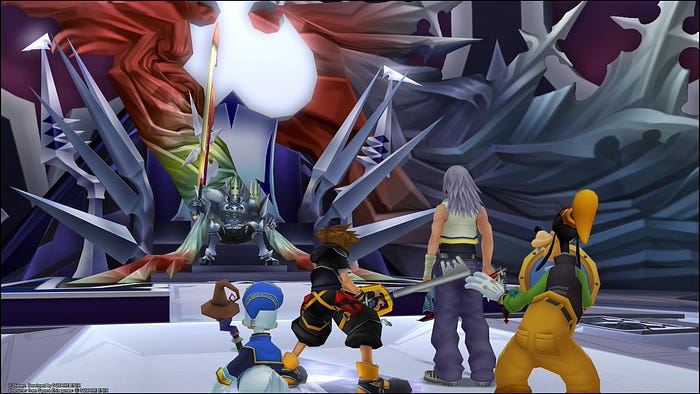
Most of Organization XIII is loyal to Xemnas, or at the very least, they’re loyal to his cause. The Organization seems to spend most of its time mentally torturing people, driving them to darkness so that they’ll become Heartless, and then recruiting their Nobodies.
You see this in action the most directly with Xaldin in Beast’s Castle. He’s doing everything he can to convince the Beast that no one could possibly love him, and that he should sever his emotional connections because he’s doomed to be unhappy. Once you save him, The Beast explains that Xaldin had taken all of the sadness in his heart and turned it into blind, indiscriminate rage. Not to keep hammering on this goofy metaphor, but what the Organization is doing is really similar to the ways various extremist right-wing groups recruit people. In this case, it’s weirdly evocative of incel ideology. “You’re unlovable, the world won’t give you the happiness you’re entitled to, so weaponize your own self-hatred to hurt other people.” About the only difference is that the hatred Xaldin espouses isn’t explicitly gendered, but since it’s contextualized in the story of Beauty and the Beast, that gendering is implicit.
So, under this lens, Nobodies and Organization XIII represent some seriously terrible people. People who have suppressed their own empathetic urges because they get in the way of their desire for power. It’s not that Nobodies can’t feel, it’s that they refuse to feel, because they equate a lack of emotion with strength. It makes perfect sense then that the climax is a two-on-one fight where Sora and Riku team up to defeat Xemnas. If Xemnas represents the rejection of your feelings in the pursuit of power, then it’s some real solid storytelling for all of that power to crumble in the face of two people who deeply love one another. Moreover, that dialogue I quoted earlier suits this interpretation really well. Xemnas is trying to appeal to Sora’s emotions and demand he be treated fairly, but his whole ideology is founded on treating people unfairly. Sora isn’t being hateful, he’s just refusing to debate a fascist.
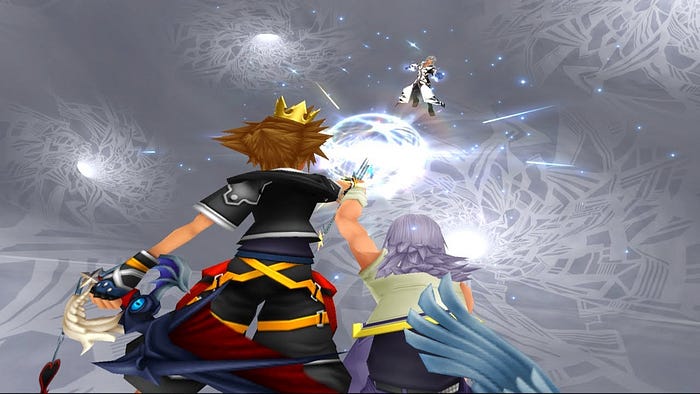
Okay. But then how does any of that square with the Roxas and Axel stuff?
So… Do Nobodies Deserve Our Sympathy Or Not?
The quick and easy answer to untangle this apparent contradiction is just to say, “Nobodies are sympathetic, but Organization XIII isn’t.” The Nobodies are a group of people who are dehumanized and hated, and there’s a clear narrative thread expressing that that’s a terrible thing to do. On the other hand, Organization XIII exploits the Nobodies by positioning itself as the only place that they can belong, cultivating all the negative feelings that they have in order to empower Xemnas, all while reinforcing the lie that those negative feelings don’t exist in the first place.
That mostly works, mostly. But it still doesn’t really sit right with me.
Xemnas’ message is that the world has rejected Nobodies, and that they should therefore join him to violently seize power and build a new world that puts them at the top of the pyramid. It’s pretty easy to read Xemnas as a fascist, and compare his rhetoric to right-wing assholes whining about how actually if you think about it they’re the persecuted ones because no one will tolerate their desire to persecute others.
But it falls apart because Nobodies actually are a persecuted people. The first few hours of the game are all about depicting a Nobody being persecuted.
Setting aside the parallels I’m trying to draw here, I think there’s a core contradiction in the narrative of Kingdom Hearts II that makes parsing any definitive message really difficult.
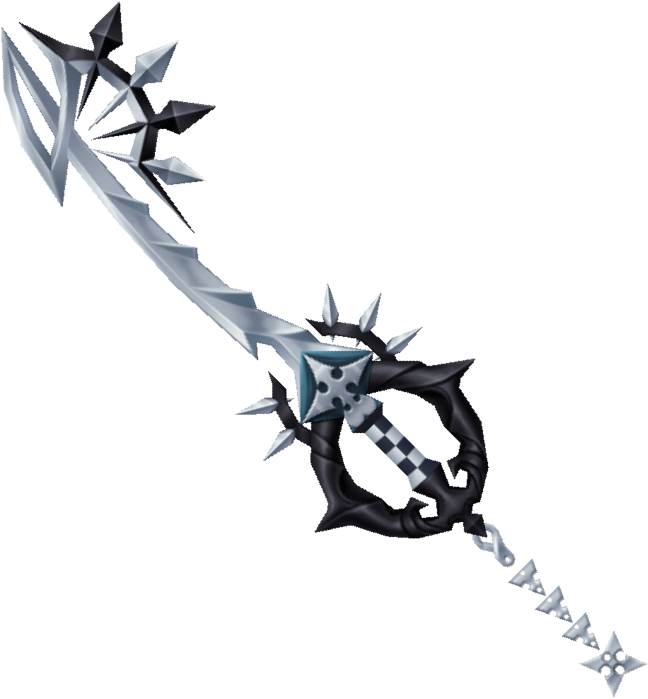
Are the Nobodies supposed to represent a people or an ideology? If they’re a people, then the game depicts a marginalized group struggling to survive, and the themes are about how awful it is to other them for being different. In that case, the climax falls flat because it fails to engage with that idea. If they’re an ideology, then the game is about how feelings are important, and abandoning them turns us into monsters. but in that case, all the Roxas stuff feels like a non-sequitur that undermines the message.
So… what if you take both interpretations at the same time? The Nobodies are a people and an ideology. We’re right to suppress their ideas because they’re harmful and toxic, but no one who rejects those ideas should be treated poorly, regardless of who they are. That’s… getting closer to reconciling everything. But if you take this tack then you’re basically arguing that Roxas, Axel and Naminé are “some of the good ones,” which… yikes. What’s more, the primary way they prove that they’re “good” is by sacrificing themselves to support people like Sora, who’s empowered by the same systems and structures that oppress them. Which, double yikes.
I don’t… think that’s what the game’s going for, though I can think of bits of evidence to support that really shitty reading. For instance, Ansem the Wise talks extensively about how Roxas and Naminé are unique among Nobodies because of the circumstances of their birth. They’re not like those other Nobodies. But, then, a lot of those other Nobodies seem to have voluntarily given up their hearts, which goes right back to making it hard to read the Nobodies as a people.
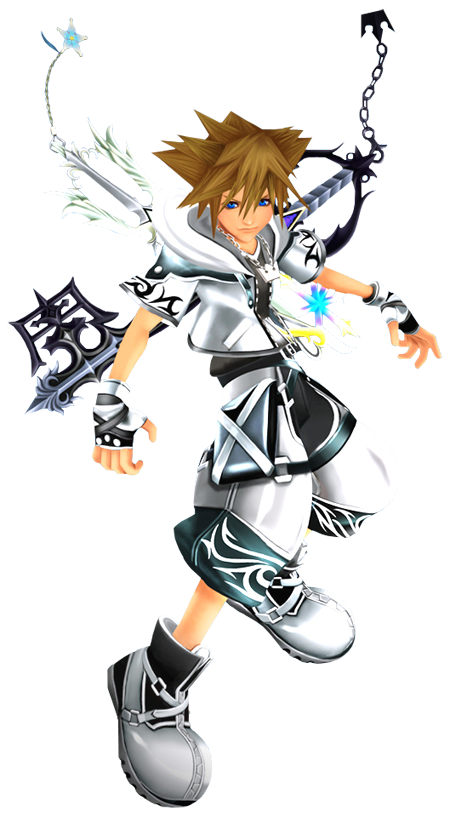
The whole thing is just kind of a big tangled mess, and ultimately I don’t think there’s a single satisfying reading of Kingdom Hearts II that accounts for all these disparate elements. I think the writers probably came up with the basic idea for Nobodies, thought they were a really cool concept, and then had a few different ideas about what metaphors could be mapped onto that concept, which never really dovetailed properly in the final script. Nobodies serve multiple purposes throughout the story, and individual scenes demand that you read them one way or another to really make sense of them thematically, but there’s no overarching idea that unites all of the different pieces. Which means that you’re left with a narrative with lots of powerful individual moments that fail to add up to a satisfying whole.
Going forward, I really hope they figure out a more coherent message with regard to the Nobodies. There’s a lot of space to work here, and I think there’s absolutely potential to build this into something that makes a little more sense. It’s also possible that future games might add more context to this one that smooths out all these frustrating questions. Or, maybe they’ll just say some things that get me thinking about this story in a new way that makes the whole thing click! I don’t think that’s especially likely, but I’m certainly not so arrogant as to believe it’s impossible that I just missed the point here. I ain’t no Ansem.
Even with the thematic messiness, I still really enjoyed the story of Kingdom Hearts II because of the power of all the individual moments. The Roxas prologue is fantastic, the war in Hollow Bastion ruled, and everything that happens once you get to The World That Never Was is incredible. Sora and Riku’s final moments on the beach, where they realize that they’re going to die there but are content because they’re together, is some really powerful stuff. I just wish everything had lined up a tiny bit better.
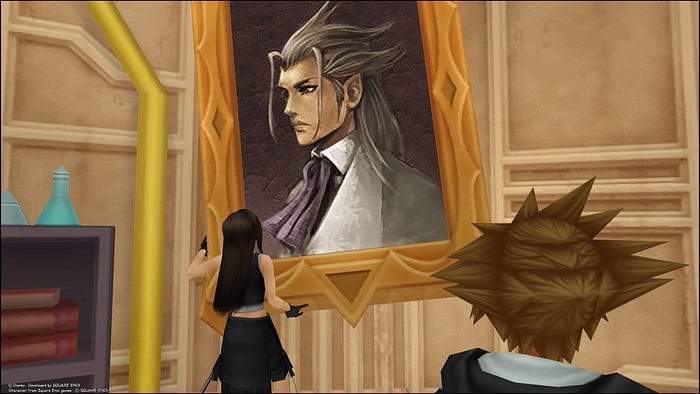
Random Stray Thoughts
- Pete is a great addition to the cast. I love the idea that there was another villain working against you in Kingdom Hearts, but he was so incompetent that you never really noticed. With how self-serious all the villains are, it’s nice to have one that works as comic relief.
- They had to do something to justify why another game is necessary, but the Corridors of Darkness sure makes it feel like those all-important magic keyholes in Kingdom Hearts are completely worthless, huh?
- In the Lion King world, they let you run really fast, which makes sense if they’re tryin’ to make being a lion feel different from being a human. But then they also… let you drift like a race car? And drifting doesn’t affect your momentum, so you can do it indefinitely. It is a baffling design decision and I love it. I spent way too long just doing donuts in the middle of the Pride Lands.
- It goes without saying, but Timeless River is a delightful section of the game. The way they include it feels really sloppy and ham-fisted, but I don’t even care because it was so cool.
- In general, they’re still really struggling to integrate the Disney worlds organically into the narrative. They did a pretty good job with Tron, but for the most part every world feels like it slams on the brakes of the story to do a more poorly executed version of a random movie. When the Disney stuff works, it adds a really fun, unique flavor to the series, but just as often you end up with sections that feel, at best, like total filler.
- It is very funny that Goofy is the most intelligent and perceptive member of the core party.
- Kairi is still just a complete and total non-character. She’s not in a coma the entire game this time around, so that’s, you know, technically an improvement? But she still does basically nothing at all, even once she gets a Keyblade of her own. She doesn’t even get it in a cool way! Riku just kind of… hands it to her. It sucks. Really hope she eventually gets to actually do something in one of these games instead of just being a blank slate for Sora and Riku to pine for.
- Speaking of Sora and Riku. I’m not generally big into shipping, but like. They’re in love with each other, right? It seems extremely obvious that they are a couple by the end of this game.
- I don’t really get the whole twist with Riku turning into Xehanort. The game does nothing with it at all, and it mostly just seems like a cheap fakeout? They don’t even leave themselves room to do something with it in the future, because he turns back almost immediately after revealing that he looks that way now. Like, I get the logic behind it, since Xehanort is where his darkness powers originated, but I don’t understand why he’s not still just transforming into his creepy muscle suit from the first two games.
- Similarly, I really don’t get the blindfold thing. Kinda just feels like someone thought blindfolds were neat and didn’t worry too much about it making sense. Which, fair enough I guess.
- I‘m a big fan of how Sora has evolved as a character. He feels like he’s matured a bit, and not just because he’s outgrown that weird onesie he used to run around in. The Sora of this game feels calm and confident, but at the same time he’s unafraid to embrace his silly side. He throws himself into the episodic Disney stories with excitement and enthusiasm, but also rarely seems to take them all that seriously. He comes off like an older brother playing make believe with younger siblings and having a blast doing it. He’s eager to play, eager to help, and eager to learn. He’s an extremely endearing hero.
Conclusion
I liked Kingdom Hearts II! It was fun and exciting, and had some narrative and character beats that I found legitimately affecting. The gameplay has made huge strides, even if it’s still not quite where I’d like it to be, and while the story is kind of messy and doesn’t quite come together in a satisfying way, I appreciate the level of ambition that it displays. It’s a game that swung for the fences, and I really respect that.
Anyway, guess it’s time to go watch the cutscenes for 358/2 Days! I’m really looking forward to it. I know that it’s an interquel that covers Roxas’ time with Organization XIII, and that feels like the perfect space for a narrative that smooths out and further explores the Nobodies. Hopefully I end up liking what they do!
Actually, I’ve already watched through 358/2 Days, so I already know whether I like it or not. You can find out here!
